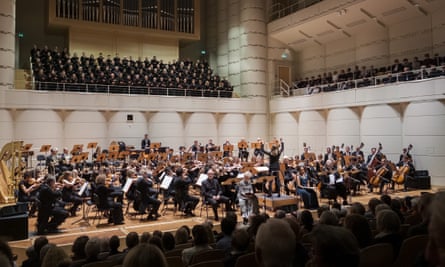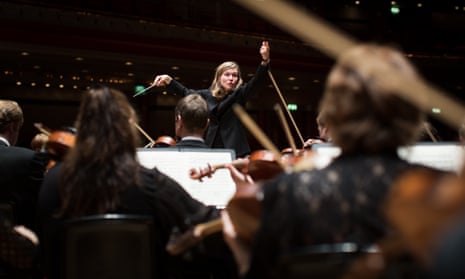The City of Birmingham Symphony Orchestra has just returned home from an eight-day tour of Germany. Our music director, Mirga Gražinytė-Tyla, conducted all-British programmes of music in Dortmund, Cologne, Baden-Baden and in a four-day Hamburg residency at the city’s spectacular new concert hall, the Elbphilharmonie. (At which venue, our visit coincided with the annual window clean, an expert job that involves hanging on ropes and pulleys up to 108m above the ground. Tom Cruise scaling the Burj Khalifa in Mission Impossible has nothing on these guys.)
German train services are fast, frequent and clean, and for the three long journeys up and down the country, we went by rail without a hitch. Almost. A cancelled train found 100 of us without seat reservations on a very full later service. With no wifi and hardly any 4G signal on much of the journey, it was a good job that the views out of the window – especially when following the course of the Rhine – were so splendid.
This was the first of 10 international tours planned across our centenary celebrations between now and summer 2021. But it was also potentially our last tour before the UK leaves the EU.
Having just passed an anniversary of my own – 20 years as the orchestra’s chief executive and a veteran of 61 European tours during that time – I thought I could offer some observations on taking British music to Europe, in the age of Brexit.

1. Beyond a few very well-known works, it is generally difficult to persuade European promoters to let us bring British music on tour. We brought a grand sweep of our musical history, from Purcell to George Benjamin and a new work by Thea Musgrave, by way of Ruth Gipps and an unfamiliar Walton as well as Elgar, Vaughan Williams, Britten and Tippett – which felt particularly important at this point in time. So much of this music is played too rarely in the UK, never mind outside it – and we were delighted to find audiences who seemed genuinely curious to encounter new names and sounds.
2. Elgar’s Cello Concerto is one of only two pieces from this selection that we have toured previously in my time at the CBSO. I never tire of it, and a few weeks short of the centenary of its disastrous premiere, it sounds as fresh as ever (especially as played by rising star Sheku Kanneh-Mason), its lyrical melancholy identifying it as Exhibit ! one of the most characteristic strands in British music.
3. I took some convincing from Mirga that Vaughan Williams’s achingly beautiful Tallis Fantasia would work well at the end of a programme, played without a pause following George Benjamin’s Ringed by the Flat Horizon. In fact it worked brilliantly, and the Vaughan Williams gathered a whole new aura by being moved from its usual place as a concert opener. Sometimes it takes an outsider’s perspective to shed new light on music that we thought we knew.
4. Tippett’s A Child of Our Time – a meditation on the events of Kristallnacht as a symbol for hatred between communities, and a plea for peace and understanding – has never felt more relevant. The audience in Dortmund joined in with the CBSO Chorus to sing two of the spirituals, as our Birmingham audience had the previous week. And in Hamburg we recorded the oratorio for CD release – the work’s first new recording in more than a decade.
5. Germans are as obsessed with Brexit as we all are (and probably better informed). In the pre-concert talk in Dortmund, the first question was “What would Benjamin Britten and Michael Tippett have thought of Brexit?” As their representative on earth (for that moment only), I answered that both were leftwing internationalists and showed through their music that it was possible both to have a patriotic immersion in English music and culture, while also displaying an openness to the wider world.

6. When our soprano for the Tippett fell ill on the day of the Hamburg concert, we had just a few hours to find a replacement who; (A), was free; (B), knew the work, and (C), could get to Hamburg in time to rehearse and sing that evening. This proved to be a Venn diagram of vanishingly small overlaps. We were very lucky that Claire Booth satisfied all three criteria, racing at a few minutes’ notice from her home to Heathrow to catch the last possible flight out. At the moment this requires no visas, work permits or other paperwork. Next month, who knows? We have heard a lot about just-in-time delivery of car parts, but last week my main concern was for just-in-time sopranos.
7. With around 15 nationalities represented in the orchestra, a mix of employed and freelance musicians, and a mix of UK residents and overseas guests, the end of freedom of movement will impose at best a massive new amount of paperwork and at worst make touring financially and operationally so tricky as to become unviable. The movement of musical instruments post-Brexit is equally concerning. Quite aside from the possibility of long delays at ports – especially in the case of a no deal outcome – there is a major issue around the Convention on International Trade in Endangered Species. Lots of the rare materials used in musical instruments (for example, tortoiseshell or ivory in bows) cannot be moved in and out of the EU without the appropriate certification – which was generally not supplied when the instruments were bought. The Association of British Orchestras has been lobbying the UK government on this (as on all the issues), but it is perhaps inevitably some way down the latter’s list of priorities.
8. Whatever happens with Brexit, we need to maintain and increase cultural dialogue and openness with our European partners. A conversation in Cologne with composer Miroslav Srnka – for whom a composing residency in Aldeburgh was a powerful experience earlier in his career – brought this home to me very strongly. He, like so many, wants to remain connected to the UK more than ever, and there remains in principle a huge openness among European promoters and artists to keep working with UK partners, as long as conditions make it viable.
9. From Monty Python to Danny Boyle’s 2012 Olympic opening ceremony, everyone loves a bit of quirky British exceptionalism. In our case that came in the form of our encore – Mirga’s arrangement of Henry VIII’s Pastime With Good Company, featuring a four-part chorus of CBSO players, supplemented by rhythmic grunts from our percussionists and the droning bagpipes section, into which I was drafted to provide “extra weight”. This showed once again that one of the best things we can offer audiences is the element of surprise – and we provoked more than a little laughter as well as a rousing cheer at the end.
10. German promoters really understand the way to a musician’s heart. In Cologne and Dortmund (as well as one of the Hamburg concerts), every player is handed a cold beer as they leave the stage. Some traditions are too good to ever disappear, Brexit or no Brexit.

Comments (…)
Sign in or create your Guardian account to join the discussion